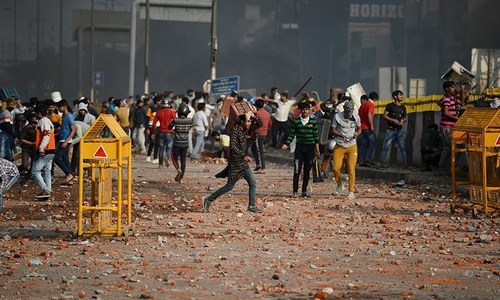LUCKNOW: An Indian court on Monday ordered the removal of scores of “name and shame” billboards after an outcry over their photos showing people accused of vandalism in deadly protests.
The huge images have been erected over recent days by authorities in Uttar Pradesh, a state run by Yogi Adityanath, who is a controversial hardline Hindu monk from the ruling party of Prime Minister Narendra Modi.
Uttar Pradesh was the epicentre of protests and violence in December following the passage of a new citizenship law, with at least 22 demonstrators shot dead in clashes with police.
The legislation fast-tracks citizenship for non-Muslim minorities from neighbouring countries and has stoked claims that Modi wants to remould India as a Hindu nation and marginalise its 200 million Muslims.
Modi denies the claims, but protests against the law were also the spark last month for the worst religious riots in decades in New Delhi when more than 50 people were killed in clashes between Muslims and Hindus.
The billboards in state capital Lucknow were aimed at pressuring those accused of vandalising property to pay for the damage in what authorities called a “name and shame” campaign.
Of the 53 people whose faces were put on display — along with their names and addresses — none has been convicted by a court.
Ordering their removal by March 16, the court in Allahabad slammed the billboards as “highly unjust” and “an absolute encroachment on the personal liberty of individuals”.
Sadaf Jafar, an activist whose name and photo figures on the giant hoardings, welcomed the ruling but said she was still worried she could come to physical harm.
“I have been left vulnerable... I am concerned about the safety of self and my children,” she said.
Another activist Deepak Kabir said: “Justice has been served. But I have been branded as a criminal. My family is scared.” Rights group Amnesty International India welcomed the ruling, saying the government had violated the right to privacy guaranteed under Indian and international laws.
“We urge the central and state governments to drop all charges and notices against such protesters, and instead ensure that the leaders and officials who have incited violence and hatred between communities are held accountable,” Amnesty tweeted.
The state government, run by an ally of India’s Hindu nationalist Prime Minister Narendra Modi, will comply with the court order but is considering its “legal options”, the chief minister’s top adviser, Mrityunjay Kumar, said.
The state government accuses the 57 people depicted in the posters of rioting in December, though none has been convicted of any crime. Those depicted accuse the authorities of trying to “name and shame” the protesters.
Hundreds of thousands of people have held demonstrations across India since late last year to protest against the citizenship law, which they say discriminates against Muslims.
Modi’s ruling Bharatiya Janata Party says the law is required to protect non-Muslim refugees across South Asia.While it was not possible to verify the religion of those featured in the posters, the majority had names commonly used by India’s minority Muslim population.
The actions of the government are “totally illegal”, said S. R. Darapuri, a former police officer who also appeared on the billboards for supporting the protests.
“We are not absconders or hardcore criminals,” he said. “The government by this act has put our lives in danger.”
The adviser, Kumar, has previously defended the billboards, saying they are an attempt to recover damages from those accused and insisting on their legality.
India’s demonstrations have spurred often-violent clashes between protesters and police, some along sectarian lines, in which more than 70 people have died, a majority in last month’s bloodletting between Hindus and Muslims in the capital Delhi.
Published in Dawn, March 10th, 2020
















































